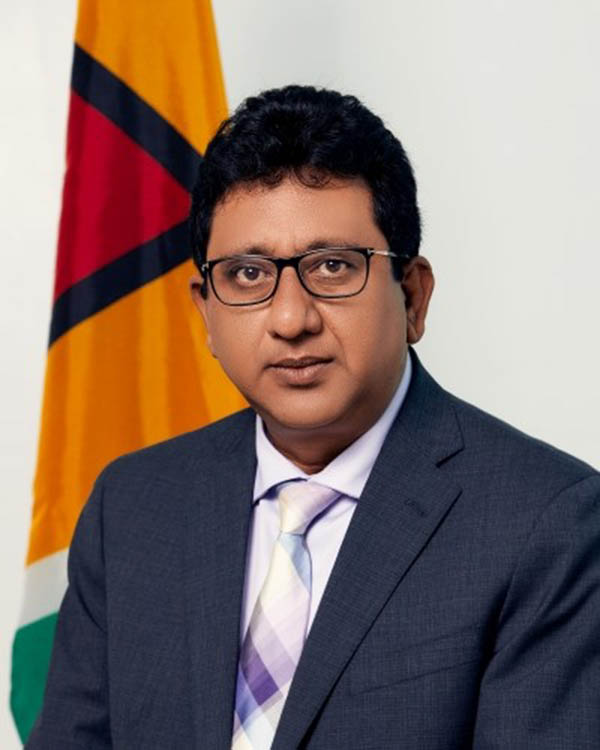In his submission in the ongoing elections petition case being heard by Chief Justice Roxane George, Attorney General Anil Nandlall has defended the constitutionality of Section 22 of the Elections Laws Amendment Act (ELAA), which was used by the Guyana Elections Commission (GECOM) to create the order for the recount of votes from last year’s general and regional elections.
In the 22-page response to submission made on behalf of petitioners Monica Thomas and Brennan Nurse, Nandlall says Guyana’s constitution does not grant the legislature the exclusive right to make laws.
“It is imperative to note that the framers of the Constitution deliberately did not use the adjective ‘exclusive’ in Article 65, in describing Parliament’s legislative functions. Whenever, the framers of the Constitution intend to confer an exclusive power in the Constitution, they expressly say so…it is clear, therefore, that Parliament does not enjoy exclusivity in law making,” he argues.
Section 22 grants GECOM the authority to amend by Order several pieces of legislation so as to resolve any difficulty related to the implementation of the Elections Act.
During the protracted process resulting from the March 2nd, 2020 polls, GECOM invoked this legislative provision and drafted Order 60, which outlined a procedure to be used for the recount of all votes cast on March 2nd.
Nandlall maintains that not only is Section 22 a valid provision but that GECOM did not even exercise its full powers when it issued Order 60.
“In issuing Order 60 as amended, GECOM did not purport to amend any legislation, whatsoever, primary nor subsidiary; neither can Order 60 be described as primary legislation. At its highest, it is subsidiary. It simply sets out a procedure for the recount of ballots, a power that GECOM possesses under the provisions of the Representation of the People Act,” he stated.
Attorneys for Thomas and Nurse are contending that the recount, which revealed that the PPP/C had won those elections, was an illegal exercise made possible by an illegal order issued using powers which are unconstitutional.
They argue in their submission that Section 22 is ultra vires the provisions of the Constitution with respect to the mode of making laws since that mode is “only to be by Bills presented to the National Assembly and passed in accordance with the provisions of the Constitution.”
“Article 170 of the Constitution provides for the mode of making legislation. In particular articles 170(1) and (6) [which notes that] subject to the provisions of article 164, the power of Parliament to make laws shall be exercised by Bills passed by the National Assembly and assented to by the President [and] a Bill shall not become law unless it has been duly passed and assented to in accordance with this Constitution,” the attorneys state.
They go on to posit that Parliament and by extension GECOM has no power to ignore these conditions of law-making that are imposed by the Constitution, which regulate Parliament’s power to make law.
Nandlall, however, reminds that the Full Court in the case of Dr. Bharrat Jagdeo v Ulita Grace Moore et al 2020-HC-DEM-CIV-FCA-26, stated that Article 162(1) (a) (b) gives wide powers to GECOM to ensure an impartial and fair election process through the exercise by GECOM of general direction and supervision over the administrative conduct of all elections.
“Section 22 of Act No. 15 of 2000 merely supplements or provides one of many mechanisms for ensuring that there is compliance with art 162 in this regard. In our view, [Section] 22 is one of the provisions which operationalizes the powers and functions of GECOM as mandated in art 162. Section 22 specifically permits GECOM to address any difficulty encountered,” the ruling noted, adding that it was clear that Parliament contemplated that difficulties may arise even after the elections since it granted GECOM the authority to make orders to address any difficulty unto three months from the date of the election.
Consequently, the AG informs the Court that while Section 22 can stand by itself it ought not to be functionally divorced from Article 162 (1)(b) of the Constitution since it is to add further ‘teeth’ to Article 162.
Parliament, he argues, with the manifest intendment of conferring on GECOM that enormous breadth of power expressed in section 22 of the ELAA to complete the discharge of its constitutional mandate of declaring final results in an election.
He uses this same point to dismiss contentions that the ELAA conflicts with the Constitution and violates the doctrine of separation of powers.
The attorneys for the petitioners, he states, has cited no Article in the Constitution with which Section 22 is inconsistent.
Further the AG highlights what he says is Parliament’s sovereign power to make such laws, as it chooses, including laws that permit delegation of its legislative functions, provided that it makes none that the Constitution forbids.
Citing the text Fundamentals of Caribbean Constitutional Law, Nandlall says that the authors noted that “There is no strong separation between legislative and executive power in the Anglophone Caribbean. While the power to make laws is constitutionally vested in Parliament, there can be a voluntary redistribution of powers.”
The case of Flossiac CJ in Astaphan v Comptroller of Customs (1996) 54 WIR 153 is said to have recognized that the delegation or transfer of legislative power by the legislature to the executive is not per se inconsistent with the principle of separation of powers, provided that the legislature ‘retains effective control’ of its powers.
Effective control is maintained if the legislature limits the power or establishes guidelines or a policy for its exercises.
The AG added that these authorities make it clear that in enacting section 22 of the ELAA, the Guyana Parliament was exercising a long established legislative power and the contention that it violated the separation of powers doctrine is untenable and without basis.






